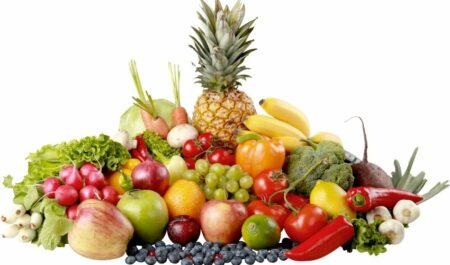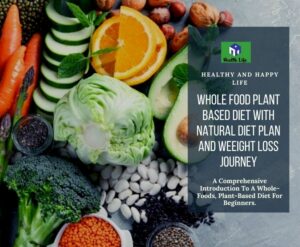There are a lot of different schools of thought on which diet is the healthiest option. However, many who are concerned with health and wellbeing are in agreement that diets that place an emphasis on fresh, whole components and limit the use of processed foods are preferable for general wellness. In this article is going to explore about what is the usefulness of whole food plant based diet for weight loss journey.
The diet that is centered on plants and entire foods accomplishes this goal.
It is beneficial in accelerating weight reduction and increasing health, and it places an emphasis on foods that have undergone little processing, particularly plants.
This article provides a comprehensive discussion of the whole foods, plant-based diet, covering all you need to know about it, including its possible health advantages, items to consume on the diet, and an example meal plan.

What Exactly Is Meant By The Term “Whole Foods” And “Plant-Based Diet”?
There is no agreed-upon definition of what defines a diet consisting solely of plant-based meals and whole foods (WFPB diet). The whole foods, plant-based (WFPB) diet is not so much a meal plan as it is a way of life.
This is due to the fact that plant-based diets can look very different depending on the degree to which a person incorporates items from other animals into their eating habits.
In spite of this, the fundamental tenets of a plant-based diet that emphasizes whole foods are as follows:
- focuses on unprocessed, minimally altered versions of real foods.
- Limits or avoids animal products.
- a diet that places an emphasis on plant-based foods, such as vegetables, fruits, whole grains, legumes, seeds, and nuts, which together should make up the bulk of what you consume.
- items that have been refined such as added sugars, white flour, and processed oils are not included.
- Places a strong emphasis on the quality of the food consumed, with many adherents of the WFPB diet advocating for the use of organic and locally produced produce wherever it is available.
Because of these factors, people frequently get this diet mixed up with vegan or vegetarian diets. These diets are not the same, despite the fact that they are comparable in certain respects.
Vegans are people who do not consume any goods derived from animals, such as dairy, meat, poultry, fish, eggs, or honey. Vegan diets are becoming increasingly popular. The consumption of any form of meat or poultry is not permitted in the diets of vegetarians; however, some vegetarians do consume eggs, shellfish, or dairy products.
The WFPB diet, on the other hand, allows for more leeway in terms of food choices. Although plant-based foods make up the majority of their diet, followers are allowed to consume some animal products.
While one person adhering to a WFPB diet may consume no animal products at all, another individual following the diet may consume trace amounts of eggs, poultry, fish, meat, or dairy products.
It Can Assist You In Reducing Your Body Fat And Improve Your Overall Health.
The problem of obesity has reached pandemic proportions in recent years. In point of fact, more than 69 percent of individuals in the United States are either overweight or obese.
Fortunately, adopting modifications to one’s food and way of life can help one lose weight and have a positive long-term effect on one’s health.
The effectiveness of plant-based diets for weight loss has been the subject of a significant number of research.
The combination of the WFPB diet’s high fiber content and its prohibition on eating processed foods is an effective strategy for minimizing weight gain and maximizing weight loss.
Those who were assigned to plant-based diets lost a significantly greater amount of weight — approximately 4.5 pounds (2 kg) over the course of an average of 18 weeks — than those who were assigned to non-vegetarian diets, according to a review of 12 studies that included more than 1,100 participants.
In the long run, adopting a healthy eating pattern that focuses on plant-based foods may also aid with weight maintenance.
According to the findings of a study that involved 65 people who were overweight or obese, those who were allocated to a WFPB diet shed considerably more weight than the control group and were able to maintain that weight reduction of 9.25 pounds (4.2 kg) throughout the course of a one-year follow-up period.
In addition, a WFPB diet does not permit the consumption of processed foods, such as soda, sweets, fast food, or refined grains; avoiding these things altogether is an effective method for weight loss in and of itself.
It Is Beneficial For A Wide Variety Of Health Conditions
In addition to the positive effects it has on your waistline, switching to a diet that focuses on plant-based whole foods can help reduce the risk of certain chronic diseases as well as the symptoms of those conditions.

Coronary Artery Disease.
The fact that WFPB diets are good for your heart is perhaps one of the benefits of these diets that is the most widely recognized.
However, the importance of the quality as well as the variety of meals consumed cannot be overstated.
Participants who ate a nutritious plant-based diet that was high in vegetables, fruits, whole grains, legumes, and nuts had a considerably reduced chance of getting heart disease than those who ate diets that were not plant-based, according to a big research that involved over 200,000 people.
On the other hand, poor plant-based diets that contained sugary beverages, fruit juices, and refined grains were related with a modestly higher risk of heart disease.
When it comes to lowering your risk of developing heart disease while sticking to a plant-based diet, eating the correct sorts of food is extremely important. Because of this, the Whole Food, Plant-Based (WFPB) diet is your best option.
Cancer.
According to the findings of certain studies, consuming more plant-based foods may lower one’s chance of developing some forms of cancer.
A research that included over 69,000 participants indicated that vegetarian diets were related with a much decreased risk of gastrointestinal cancer, especially for those who followed a lacto-ovo vegetarian diet. This was especially true for those who did not consume any eggs (vegetarians who eat eggs and dairy).
Another major research with more than 77,000 participants found that those who followed vegetarian diets had a 22 percent decreased chance of acquiring colorectal cancer compared to individuals who did not follow vegetarian diets.
Pescatarians, or vegetarians who consume fish, had the lowest risk of colorectal cancer, with a risk that was lowered by 43 percent when compared to people who did not follow a vegetarian diet.
Cognitive Decline.
According to the findings of a number of research, older persons who consume diets that are abundant in vegetables and fruits may have less cognitive decline and be less likely to develop Alzheimer’s disease.
Plant-based diets contain a greater quantity of plant chemicals and antioxidants, both of which have been found to delay the course of Alzheimer’s disease and restore cognitive impairments.
In a large number of studies, researchers have shown a significant correlation between increased consumption of fruits and vegetables and a slower rate of cognitive deterioration.
Eating a diet that included more fruits and vegetables was associated with a 20 percent lower chance of developing cognitive impairment or dementia, according to a meta-analysis of nine separate studies that included more than 31,000 participants.
Diabetes.
It’s possible that switching to a whole foods, plant-based, and mainly plant-based diet will help you better manage current diabetes and cut your chance of acquiring it.
A research that involved more than 200,000 participants revealed that those who followed a healthy eating pattern that was based on plant-based foods had a risk of acquiring diabetes that was 34% lower than those who followed an unhealthy eating pattern that was not based on plant-based foods.
Another study found that plant-based diets, namely vegan and lacto-ovo vegetarian diets, were related with roughly a 50 percent lower incidence of type 2 diabetes when compared to diets that included meat, fish, and other animal products.
In addition, studies have indicated that persons with diabetes who follow plant-based diets have better control over their blood sugar levels.
It Is Beneficial To The Environment To Follow A Plant-Based Diet That Emphasizes Whole Foods.
Making the switch to a diet based on plants is beneficial not just to your health but also to the protection of the natural world around you.
Diets that are mostly composed of plant foods are associated with lower overall ecological footprints.
The adoption of environmentally responsible eating practices can assist in the reduction of greenhouse gas emissions, water consumption, and land utilized for factory farming, which are all contributors to the acceleration of global warming and the destruction of the natural environment.
The diets that had the fewest amounts of animal-based items, such as vegan, vegetarian, and pescatarian diets, were found to have the most positive impact on the environment in a meta-analysis of 63 separate research.
According to the findings of the study, a change in Western dietary habits toward more environmentally friendly, plant-based eating patterns might result in a reduction of greenhouse gas emissions and land usage of up to 70 percent and a decrease in water consumption of up to 50 percent.
In addition, cutting down on the amount of animal products you consume and increasing the amount of locally grown and sustainably farmed produce you buy is a great way to stimulate the local economy and minimize your reliance on factory farming, which is an unsustainable mode of food production.
What To Consume On A Diet Based Entirely On Plants And Whole Foods.
Animal items constitute the focal point of the majority of people’s meals, from breakfasts consisting of eggs and bacon to dinners consisting of steak.
When transitioning to a plant-based diet, the focus of each meal should be on foods derived from plants.
If eating foods from animals is something you want to do, you should limit the amount you consume and pay close attention to the quality of the meal.
Instead of serving as the primary focus of a plant-based dinner, animal products including dairy, eggs, poultry, meat, and seafood should be utilized more as a supplement to the meal.
A shopping list focused on whole foods and plant-based products.

Fruits.
Berries, citrus fruits, pears, peaches, pineapple, bananas, etc.
Vegetables.
Included on this list are vegetables such as kale, spinach, tomatoes, broccoli, cauliflower, carrots, asparagus, and peppers.
Vegetables High In Starch Content.
Vegetables such as potatoes, sweet potatoes, and butternut squash, among others.
Whole Grains.
A variety of whole grains, including brown rice, rolled oats, farro, quinoa, brown rice pasta, and barley.
Unsaturated Fats.
Avocados, olive oil, unsweetened coconut, and other healthy foods are examples.
Legumes.
Included in this category are chickpeas, lentils, peanuts, black beans, and other legumes.
Seeds, Nuts, And Nut Butters.
Included in this category are items such as almonds, cashews, macadamia nuts, pumpkin seeds, sunflower seeds, natural peanut butter, tahini, and many others.
Milks Derived From Plants That Are Not Sweetened.
Milks made from nuts, such as coconut milk, almond milk, cashew milk, etc.
Herbs, Spices, And Seasonings.
Herbs and spices such as basil, rosemary, turmeric, curry, black pepper, and salt are examples.
Condiments.
Salsa, mustard, nutritional yeast, soy sauce, vinegar, lemon juice, etc.
Protein Derived From Plants.
Tofu, tempeh, and other plant-based sources of protein, as well as protein powders that do not include any sugar or artificial chemicals added.
Beverages.
Coffee, tea, fizzy water, and other beverages are available.
If you decide to complement your plant-based diet with animal products, make sure to select high-quality goods from grocery shops or, even better, buy them directly from local farms.
Eggs.
Raised on pasture wherever it’s feasible.
Poultry.
When it’s feasible, organic and free-range.
The Meats Beef And Pork.
Grass-fed or pasture-raised wherever it is possible.
Seafood.
Whenever it’s feasible, wild-caught from fisheries that are managed sustainably.
Dairy.
When it is available, organic dairy products made from cows that were grown on pasture.
On This Diet, Some Foods Should Be Limited Or Completely Avoided.
The Whole Food Plant-Based (WFPB) Diet is a manner of eating that emphasizes eating foods in their purest, most unprocessed forms. This rules out meals that have undergone a great deal of processing.
When going grocery shopping, give priority to obtaining fresh foods, and when selecting goods with labels, look for those that have as few ingredients as is humanly feasible.

Foods To Stay Away From.
Eaten In A Hurry.
A variety of fast food options, including French fries, cheeseburgers, hot dogs, chicken nuggets, etc.
Sugars And Sweeteners That Have Been Added.
Sugar for the table, soda, juice, baked goods, cookies, sweets, sweet tea, cereals with added sugar, etc.
Refined Versions Of Grains
Rice, pasta, bread, bagels, and other foods like these are all made using white flour.
Items That Are Prepackaged And Easily Accessible.
Things like chips and crackers, cereal bars and frozen meals, among other things.
Vegan-Friendly Foods That Have Been Processed.
products derived from plants rather than animals, such as Tofurkey, fake cheeses, vegan butters, etc.
Sweeteners That Are Not Natural.
Equal, Splenda, Sweet’N Low, and other similar substitutes.
Products Derived From Processed Animals.
Including but not limited to bacon, lunch meats, sausage, and beef jerky.
Reducing Intake Of These Foods
Although certain wholesome foods from animals can be incorporated in a Whole Food Plant-Based diet, consumption of the following items should be kept to a minimum in any plant-based diet:
- Beef.
- Pork.
- Sheep.
- Game meats.
- Poultry.
- Eggs.
- Dairy.
- Seafood.
A Sample Menu For One Week’s Worth Of Meals.

Making the switch to a diet consisting primarily of plant foods and whole foods need not be difficult.
The food for one week that is provided below will help set you up for success. It contains a limited number of goods derived from animals, but the degree to which you consume foods derived from animals in your diet is entirely up to you.
Monday.
Breakfast.
Oatmeal prepared with coconut milk and garnished with berries, walnuts, and more coconut.
Lunch.
A substantial salad with chickpeas, fresh veggies, avocado, pumpkin seeds, and goat cheese as the toppings.
Dinner.
Curry made with butternut squash.
Tuesday.
Breakfast.
a topping of sliced strawberries, unsweetened coconut, and pumpkin seeds sprinkled over plain yogurt with full fat.
Lunch.
Chili made without meat.
Dinner.
Tacos made with sweet potato and black beans.
Wednesday.
Breakfast.
A beverage consisting of unsweetened coconut milk, peanut butter, berries, and plant-based protein powder that has not been sweetened.
Lunch.
Hummus and vegetable wrap.
Dinner.
Zoodles made of zucchini covered with pesto and served with chicken meatballs.
Thursday.
Breakfast.
Oatmeal with a savory topping consisting of avocado, salsa, and black beans.
Lunch.
Quinoa, vegetable and feta salad.
Dinner.
Fish cooked on the grill with sweet potatoes and broccoli that have been roasted.
Friday.
Breakfast.
Tofu and veggie frittata.
Lunch.
A substantial salad with grilled shrimp as the topping.
Dinner.
Roasted portobello fajitas.
Saturday.
Breakfast.
A protein smoothie consisting of blackberries, kale, cashew butter, and coconut.
Lunch.
Sushi made with brown rice, avocado, and vegetables, served with a seaweed salad.
Dinner.
Eggplant lasagna topped with cheese and served with a substantial side salad.
Sunday.
Breakfast.
Vegetable omelet cooked with eggs.
Lunch.
Quinoa dish topped with roasted vegetables and tahini sauce.
Dinner.
Burgers made with black beans and served on top of a big salad with avocado slices.
As can be seen, the usage of animal products should be kept to a minimum if one follows a diet that is centered on plants and whole foods.
However, many people who follow WFPB diets eat more or fewer animal products depending on their unique dietary needs and preferences. This is because WFPB diets emphasize plant-based foods rather than animal products.
The Bottom Line.
A whole-foods, plant-based diet is a manner of eating that places an emphasis on consuming plant-based foods while avoiding the consumption of harmful foods and ingredients, such as refined grains and added sugars.
Diets that are high in plant foods have been associated with a range of health advantages, including a lower risk of cardiovascular disease, some malignancies, obesity, diabetes, and cognitive decline.
In addition, making the shift toward a diet that is more plant-based is a fantastic option for the environment.
Your health will undoubtedly improve if you switch to a diet that focuses on plant-based meals and whole foods. It does not matter which whole-foods, plant-based diet you decide to follow.
